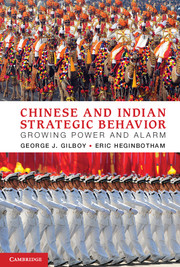Book contents
- Frontmatter
- Contents
- Figures
- Tables
- Acknowledgments
- Preface
- Abbreviations
- Map
- 1 Introduction
- 2 Strategic Culture
- 3 Foreign Policy, Use of Force, and Border Settlements
- 4 Military Modernization
- 5 Military Doctrine
- 6 Military Force Modernization and Power Projection
- 7 Economic Strategic Behavior
- 8 India, China, and Democratic Peace Theory
- 9 Meeting the Dual Challenge
- Appendix Defense Spending, Selected Additional Data
- Bibliography
- Index
- References
7 - Economic Strategic Behavior
Trade and Energy
Published online by Cambridge University Press: 05 June 2012
- Frontmatter
- Contents
- Figures
- Tables
- Acknowledgments
- Preface
- Abbreviations
- Map
- 1 Introduction
- 2 Strategic Culture
- 3 Foreign Policy, Use of Force, and Border Settlements
- 4 Military Modernization
- 5 Military Doctrine
- 6 Military Force Modernization and Power Projection
- 7 Economic Strategic Behavior
- 8 India, China, and Democratic Peace Theory
- 9 Meeting the Dual Challenge
- Appendix Defense Spending, Selected Additional Data
- Bibliography
- Index
- References
Summary
The West is nervously puzzled by the nature of rising Chinese and Indian economic might. In the space of a few months, pundits seem as likely to produce book titles that proclaim the coming “Indian Century” and the looming prospect of a China that “Rules the World” as they are to produce headlines warning that China and India are “Two Vulnerable Economies” facing a potential “Economic Crash.” How each country negotiates its domestic political-economic vulnerabilities over the near and medium term will largely determine their respective potential for global economic leadership. The way Beijing and New Delhi manage their economies will also influence their relations with trading partners, including the United States.
India and China have each undertaken programs of economic reforms and opening aimed at promoting domestic development and rising national power. Reforms and opening have produced stunning economic results. Perhaps the most important of these are rising household incomes and poverty alleviation in both countries. Greater wealth also provides greater resources that can be devoted to security and other international goals. However, despite their rapidly growing economies, both China and India will likely remain preoccupied powers for decades to come. Entering the second decade of the twenty-first century, they remain poor or at best modestly developed countries on a per-capita basis and face potential social and political turmoil as a result of domestic development imbalances.
- Type
- Chapter
- Information
- Chinese and Indian Strategic BehaviorGrowing Power and Alarm, pp. 209 - 250Publisher: Cambridge University PressPrint publication year: 2012



